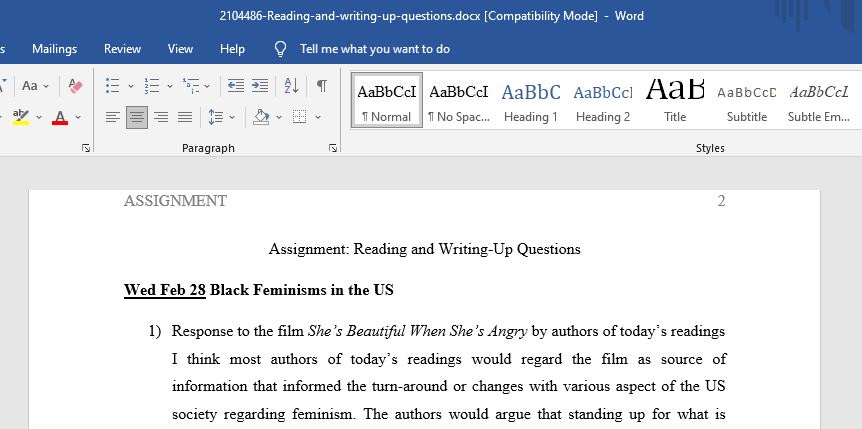Read carefully the Questions given and write their correct answers
Black feminisms in the U.S.
1) How do you think the authors of today’s readings would respond to the film She’s Beautiful
When She’s Angry? (Remember, watch it BEFORE class.)
2) Why did I assign the Combahee River Collective Statement if it was written so many
decades ago? Did the content, tone, analysis, or message sound similar to earlier
discussions this quarter?
3) Do you think bell hooks believes that white women can’t be feminists; that they shouldn’t
write or teach feminist theory?
4) According to bell hooks: “We resist hegemonic dominancy of feminist thought by insisting
that it is a theory in the making, that we must necessarily criticize, question, re-examine,
and explore new possibilities” (pg 10). What do you think she means by that? How does it
sound familiar to sentiments Prof cárdenas shared when she presented to our class?
Chicana feminism
1) What do we know about the history of Chicana feminism?
2) What similarities and differences did you notice in the two different Introductions to This
Bridge Called My Back? What do you think accounts for those similarities or differences?
3) What did you think of López’s poem? What is the message she is trying to convey?
4) What similarities did you see between Black feminism and Chicana feminism? What about
differences? Think about this with respect to history, ideology, struggles, goals, etc.
Why be feminists?
1) What do you think of Ngozi Adichie’s explanation for why “we should all be feminists”?
2) What, if anything, of Ngozi Adichie’s experiences sounded familiar to your own or those of
women you know?
3) What did you think of the “rad women” in Schatz’s book? Which ones had you heard of and
who were new to you?
4) Where does a kids’ book fit into our discussions of feminist knowledge production?
5) What did you think about reading a kids’ book for a college class? Will you keep the book?
Sell it back to the bookstore? Pass it on?
Answer preview:
Words:776

